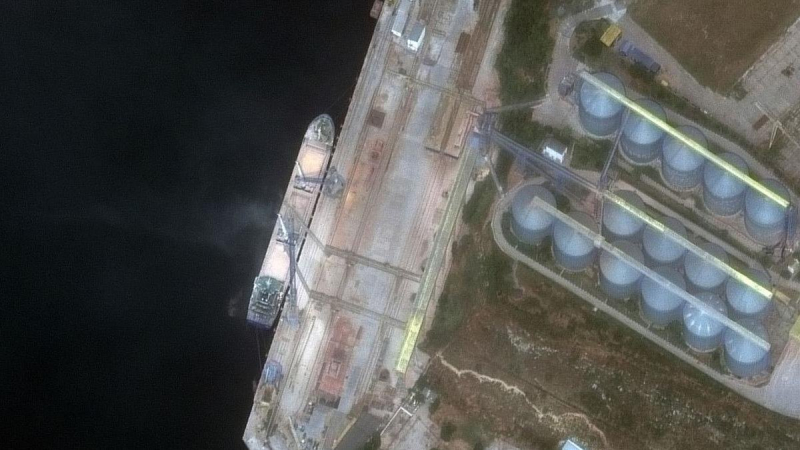
Ship with stolen Ukrainian grain in Syria/Maxar
The life of farmers in the occupied territory of the Kherson region is getting worse every day. Farmers do not know how to keep their business in the conditions of war and total robberies from Russia.
According to Channel 24 intelligence sources, the Russian invaders have completely pushed farmers away from the downed market. The only opportunity that the occupiers give people to earn money is the sale of vegetables, fruits and grains in Crimea at incredibly low prices.
The cost of any product is adjusted by the Russian Horde themselves, so the peasants cannot even break even and recoup their investments in crop of funds.
Simferopol is a logistics hub for stolen agricultural products
- Since the beginning of the occupation of part of Kherson, the Russian invaders have implemented a strategy of restricting farmers and taking control of the possibility of selling any farm products in the territory controlled by Ukraine.
- This has led to hundreds of farmers being faced with the choice of selling tens of thousands of tons of fruits and vegetables in the occupied Crimea or let the crops go bad.
- Most entrepreneurs, under the pressure of circumstances, and sometimes because of threats of execution, were forced to agree to the conditions of the Russians and start transporting their products to the occupied peninsula.
- The Russians forced the owners of agricultural enterprises to cooperate and at the same time stole equipment from them.
- The cost of vegetables, fruits and grains, which the invaders put up to buy the crops from farmers, led to crazy losses and the closure of enterprises. Currently, more than 60% of farmers in the Kherson region have been forced to stop their activities.
The scheme, according to which the Russian invaders are now actually stealing the products of farmers, is quite simple. The only way to sell products is to export them to the Crimea, where Russian traders work. Trucks with vegetables and fruits are sent through the administrative border with the peninsula. And if trucks leave the Kherson region with Ukrainian license plates, then these trucks are moving through the territory of Crimea with Russian ones. They are replaced during “control”.
At the checkpoint near Dzhankoy, which was established by order of Russian generals, carriers are sent to one or another trader in Simferopol.
Vegetables and fruits are reloaded in the capital of the Autonomous Republic, after which they are either transported for sale along the peninsula or pulled across the bridge to Russia. Grain is sent either to ports for further export by sea, or is also transported to the territory of the aggressor country. In fact, Simferopol has become a logistics hub for stolen goods in the Kherson region.
At the same time, after the formal purchase of crops from farmers, according to the documents, it becomes “Russian”.
Intermediaries earn crazy money and “legalize” stolen goods
According to intelligence, price tags for wheat and other goods are set by traders who are intermediaries and work under the control of the military-political leadership of Russia. Traders, who are intermediaries, buy grain at a price of 6,000 rubles per ton (about $80). At the same time, they do not immediately pay off suppliers. They promise to pay the money a week after the “sale”.
The intermediaries themselves pocket crazy sums, because in Crimea the market price of wheat is 18,000 rubles per ton (about $240). Of course, almost all the income from such a deal ends up in the wallets of the highest ranks of the occupiers. At the same time, Russia itself, as a state, earns on the difference in cost on the peninsula and the world market, because a ton of wheat in the world costs more than $400. At the same time, unfortunately, the occupying country does not suffer from a lack of buyers. There are many states that buy grain, not paying attention to the fact that its origin may be Ukrainian.

